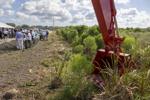Posted on February 14, 2025
Coastal advocates are pressing state officials for answers on the future of the $3 billion Mid-Barataria Sediment Diversion project, an unprecedented wetlands restoration plan years in the works but recently thrown into doubt because of opposition from Gov. Jeff Landry.
Few of those answers emerged at a public hearing Tuesday on the state’s annual coastal plan. Advocates there urged the state to move forward with the project, but Coastal Protection and Restoration Authority executive director Glenn Ledet instead focused his comments on other large-scale works on the books for the coming fiscal year.
The Mid-Barataria project was long seen as the linchpin of the state’s coastal master plan, intended to both build land and nourish other marsh-building projects in the region by mimicking the geological processes that created south Louisiana. Long a goal of coastal advocates and a range of scientists, the project took off because of fines and settlement dollars paid out after the 2010 BP oil spill.
But it has been controversial from the start, largely because of the effects it would have on shrimp and oyster fishing in Plaquemines Parish and, more recently, the escalating costs. The parish has sued to stop it, and Landry reversed the state’s course after taking office last year, leaving the project in limbo even after it broke ground in 2023.

Negotiations have been ongoing with Plaquemines officials on the project’s future. Any change would likely require further review from federal and state trustees overseeing the BP oil spill money, which could set back work for years.
A range of speakers implored Ledet to find a way to move the project forward as planned and studied, noting Louisiana’s worsening land loss crisis.
Anne Milling, whose Women of the Storm organization played a key role in drawing federal attention to the region after Hurricane Katrina, said the state’s coastal program has always prioritized scientific planning and she questioned whether that was changing. Her husband King Milling, the former Whitney National Bank chief who became a leading figure in the state’s coastal restoration efforts, was also in the audience.
“I worry if the political process has gotten involved in this, because suddenly there’s been a pause on this most important project,” she said. “So I’m terribly concerned about this. I want to figure out a way to unblock this project, get it back on track. We cannot afford to put our heads in the marsh and not have a project of this scale and scope.”
‘At the appropriate time’
Other speakers included state Rep. Joseph Orgeron, who has pushed in the Legislature to move the project forward. He acknowledged that Grand Isle, which is part of his district, is opposed to the diversion, but said he would “fight tooth and nail” for additional money to help if there are negative economic effects on the island. Some $378 million is already set aside in assistance money, including for commercial fishers.
The Republican said that while the 1,000 people of Grand Isle oppose the project, 43,000 constituents in lower Lafourche mostly support it.

“Knowing that the entire wetlands of the Barataria Basin was built by the Mississippi River’s fresh water and sediment, and it being in the master plan since (former governor) Kathleen Blanco, it’s extremely important that we resolve this issue and, once again, get it back on track, in construction as properly permitted, as fully funded and as designed,” he said.
Ralph Herrmann, who lives in Plaquemines Parish, argued the diversion would take too long to produce results and cost too much money. He urged the state to use the money for more marsh-building projects using dredged sediment instead.
“We do not need this project. We can have our land now. We can have our protection now,” the 71-year-old retiree said. “This is not in the best interest of the state.”
Despite the uncertainty, continued spending on the Mid-Barataria project is included in the coastal authority’s $1.8 billion annual plan for the fiscal year beginning in July. That, however, does not mean the project won’t be changed or eventually eliminated, with the money shifted to other plans.
Ledet did not address Mid-Barataria in his presentation of the plan, instead focusing on projects like the major effort to restore the disappearing Chandeleur Islands off southeast Louisiana and the state’s biggest marsh-creation project to date in Lake Borgne.
He called the annual plan among the largest in state history and stressed that the vast majority of the money will go toward actual work.
“We’ve got our largest share that goes to construction in the state’s history,” Ledet said. “That’s 80% of those dollars will go to actually putting projects on the ground.”
Asked after the hearing about the status of Mid-Barataria, Ledet said he could not provide details for now, citing ongoing discussions. He said Landry and CPRA board chair Gordon Dove would provide further information “at the appropriate time.”
The public comment period for the annual plan ends March 22. An interactive map, further details and the opportunity to comment can be found at ap26.coastal.la.gov.






